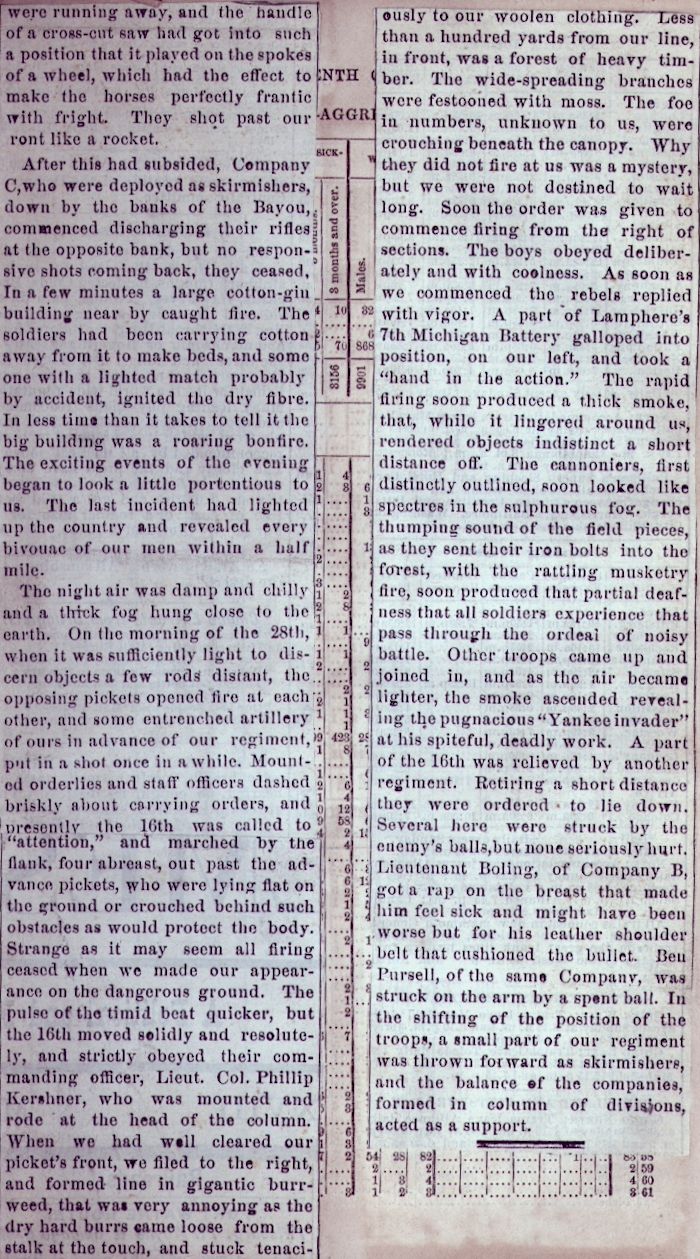| Camp & Field Page 52 | Camp & Field Index Page | 16th OVI Home Page | Camp & Field Page 53B |
The Camp & FieldArticles by Theodore Wolbach |
 Cpl. Theodore D. Wolbach |
The following image is taken from a book titled "Mortality and Statistics of the Census of 1850" in which it is believed retired Captain Rezin H. Vorhes, Company H, pasted over the pages a series of articles written by Cpl. Theodore D. Wolbach, Company E, titled "Camp and Field" and published, by chapter, in the Holmes County (Ohio) Republican newspaper from February 24, 1881 to August 17, 1882. The articles tell the story, in great detail and color, of the 16th OVI, from the inception of the 3-year regiment in October, 1861, through all its camps, battles and marches until it was disbanded on October 31, 1864. The articles pasted in the Vorhes book cover the first 35 chapters, published through October 20, 1881. All the remaining chapters were recently found in a Holmes County library by researcher Rob Garber who obtained copies, performed the transcriptions and provided to this website and which are also presented here, thus providing the complete work by Theodore Wolbach.
Throughout these articles click on the underlined white text for additional details.
The webauthor thanks 16th Ohio descendant Rob Garber for his excellent research on the Camp And Field articles and for performing the tedious digital transcription of those articles found on each page. The transcriptions were made to reflect the original articles verbatim, misspellings and all. Rob is the 3rd great nephew of Capt. William Buchanan, Company F, 16th Ohio, who served in the 90-day regiment as a private, re-enlisting in the three year regiment, and eventually making the rank of Captain of Company F. Thanks Rob!
Page 53 - Chapter 32 - December, 1862
 |
were running away, and the handle of a cross-cut saw had got into such a position that it played on the spokes of a wheel, which had the effect to make the horses perfectly frantic with fright. They shot past our front like a rocket. After this had subsided, Company C, who were deployed as skirmishers, down by the banks of the Bayou, commenced discharging their rifles at the opposite bank, but no responsive shots coming back, they ceased. In a few minutes a large cotton-gin building near by caught fire. The soldiers had been carrying cotton away from it to make beds, and some one with a lighted match probably by accident, ignited the dry fibre. In less time than it takes to tell it the big building was a roaring bonfire. The exciting events of the evening began to look a little portentious [sic] to us. The last incident had lighted up the country and revealed every bivouac of our men with a half mile. The night air was damp and chilly and a thick fog hung close to the earth. On the morning of the 28th, when it was sufficiently light to discern objects a few rods distant, the opposing pickets opened fire at each other, and some entrenched artillery of ours in advance of our regiment, put in a shot once in a while. Mounted orderlies and staff officers dashed briskly about carrying orders, and presently the 16th was called to |
ously to our woolen clothing. Less than a hundred yards from our line, in front, was a forest of heavy timber. The wide-spreading branches were festooned with moss. The foe in numbers, unknown to us, were crouching beneath the canopy. Why they did not fire at us was a mystery, but we were not destined to wait long. Soon the order was given to commence firing from the right of sections. The boys obeyed deliberately and with coolness. As soon as we commenced the rebels replied with vigor. A part of Lamphere's 7th Michigan Battery galloped into position, on our left, and took a |
| Camp & Field Page 52 | Camp & Field Index Page | 16th OVI Home Page | Camp & Field Page 53B |